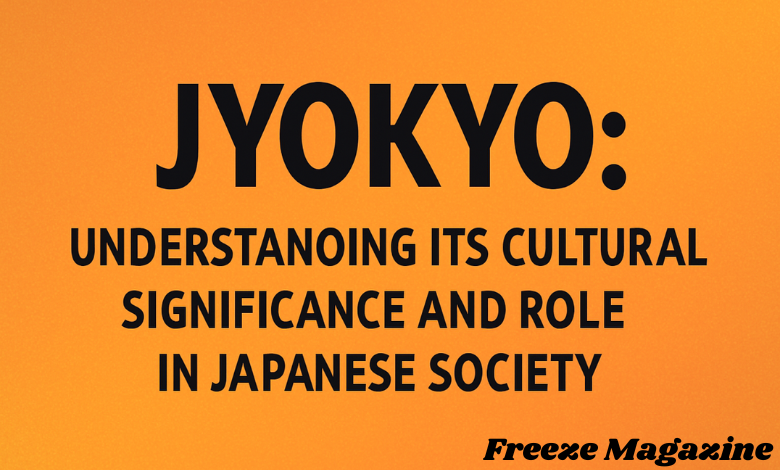Jyokyo: Understanding Its Cultural Significance and Role in Japanese Society
Introduction
In the complex fabric of human communication, certain words hold deeper meanings than their simple translations may suggest. One such word is jyokyo , which, on the surface, may seem like a straightforward term for “situation” or “circumstance.” However, this word carries with it a range of connotations, reflections on the human condition, and cultural insights that are essential to understanding the way people in certain societies interpret their environment, decisions, and relationships.
In this article, we will explore the multi-faceted nature of jyokyo, breaking it down into its linguistic, cultural, and psychological layers. We will see how this term is used in the Japanese language, its cultural significance, and how it shapes the worldview of those who use it.
The Basic Meaning of Jyokyo
At its core, jyokyo translates to “situation” or “circumstance” in English. It can refer to an event or condition that is happening in a specific moment, or the broader context in which something occurs. For instance, when asking about someone’s wellbeing, one might use jyokyo to inquire about their current situation, or when evaluating a problem, it may refer to the circumstances surrounding it.
In Japanese, jyokyo is a versatile term. It can describe a range of contexts, from the immediate to the abstract, from a personal experience to a broader societal or global condition. Yet, while it may seem like a standard term for a set of conditions or a context, the concept behind it is much more layered when examined from a cultural perspective.
Jyokyo in Context: Beyond Translation
The significance of jyokyo extends beyond its linguistic translation. In Japanese, words often carry not just a literal meaning but also a deep association with the speaker’s perception of the world and their relationship to it. The word jyokyo is no different. It implies not just an objective description of the circumstances but also an understanding of the interaction between the person and their environment. For example, in situations where an individual is asked about their jyokyo, there is often an implied sense of the individual’s responsibility or role in shaping that environment. It is a word that can simultaneously describe both the static and dynamic aspects of an event or condition. In Japan, the term can evoke a subtle layer of nuance regarding one’s responsibility to adapt, respond, or manage their situation—often with an underlying sense of harmony and balance.
The Cultural Significance of Jyokyo
To truly understand jyokyo, it is important to consider the cultural backdrop in which it exists. Japanese society places a significant emphasis on the awareness of one’s environment and the social context in which one exists. This concept is embedded in various aspects of daily life and behavior, from how individuals interact with each other to how they evaluate and navigate challenges.
In Japan, the awareness of one’s jyokyo is more than just a passive acknowledgment of one’s surroundings. It is tied to the idea of wa , or harmony. Being mindful of the situation—or the jyokyo—and understanding its implications is essential for maintaining harmony in relationships and in society. If someone is aware of the jyokyo, they are more likely to respond in a manner that preserves balance and peace, whether in a personal conversation, in business dealings, or in broader social interactions.
Jyokyo and Decision-Making
Another aspect of jyokyo is its role in decision-making. In Japanese culture, decisions are rarely made in isolation; instead, they are deeply influenced by the surrounding circumstances. This approach can be seen in both personal and professional decision-making processes. When individuals or groups evaluate a situation, the jyokyo often guides their choices. This process is not simply about what is most logical or advantageous but about considering how the decision will affect the overall environment and relationships.
For instance, in a business setting, a leader may consider the jyokyo—the current market situation, the relationships with clients, and the broader economic climate—before making any major decisions. In such cases, the term goes beyond describing just the factual situation; it involves an understanding of the social, emotional, and relational factors at play.
Jyokyo and the Japanese Concept of Time
In Japan, the concept of time is also interwoven with the idea of jyokyo. Unlike cultures where time may be seen as linear and fixed, the Japanese often see time as fluid and contingent upon circumstances. This view of time plays into how people interpret their jyokyo at any given moment. A person’s jyokyo can change depending on how they relate to their environment, the people around them, and even their own personal state of mind at a particular time.
For example, in traditional Japanese arts such as tea ceremonies, flower arranging (ikebana), or martial arts, the idea of being fully aware of the jyokyo is critical to the practice. These activities often involve sensitivity to the moment, where decisions about placement, movement, or action are not merely based on rules but on the nuances of the situation as it unfolds in real-time. This is a reflection of the fluidity of time and the importance of understanding the present jyokyo in these contexts.
Jyokyo and Conflict Resolution
One area where jyokyo is often referenced is in the resolution of conflict. In any society, people are faced with disagreements or difficult situations, and in Japan, the jyokyo plays a significant role in finding a resolution. Rather than focusing on the binary ideas of right and wrong, success and failure, the concept of jyokyo encourages a more holistic approach to conflict resolution. The goal is to understand the circumstances—both external and internal—that have led to the situation and then address the issue in a way that preserves balance and social harmony.
This can be seen in traditional Japanese practices such as mediation, where parties involved are encouraged to look at the broader jyokyo and make decisions that are sensitive to all perspectives. In contrast to the adversarial approaches common in some other cultures, the Japanese perspective tends to focus on compromise, understanding, and maintaining relational harmony in the face of differing opinions.
Jyokyo in Modern Japan
In modern Japan, the concept of jyokyo still holds a significant place in both personal and professional life. As Japan faces globalization and the pressures of a rapidly changing world, the ability to understand and navigate one’s jyokyo has become even more important. Individuals are continuously confronted with complex, dynamic circumstances that require them to assess their environment, consider multiple perspectives, and adapt accordingly. In the workplace, the awareness of jyokyo has become critical in areas such as project management, customer service, and corporate decision-making. Many businesses in Japan place great value on employees who can navigate complex situations with a deep understanding of the jyokyo at play, balancing both internal company dynamics and external market conditions.
Similarly, in the personal lives of Japanese people, jyokyo plays a role in how individuals manage their relationships with family, friends, and colleagues. The ability to understand and react appropriately to the situation is seen as an important social skill and a marker of emotional intelligence.
The Psychological Dimensions of Jyokyo
From a psychological standpoint, jyokyo has significant implications for how people process events, stress, and emotions. A person’s understanding of their jyokyo can influence their sense of agency, autonomy, and control over their environment. If individuals perceive their jyokyo as something they can navigate and influence, they are more likely to feel empowered and proactive. On the other hand, if they feel that the jyokyo is outside their control, it may lead to feelings of helplessness or anxiety. This dynamic is particularly important in Japanese culture, where social conformity and the desire to maintain harmonious relationships can sometimes conflict with the individual’s internal emotional state. Understanding one’s jyokyo allows a person to make sense of these conflicting pressures and find a balanced approach to managing them.
Conclusion
Jyokyo is more than just a word for “situation” or “circumstance.” It is a term that reflects the complex and nuanced way in which people interpret their environments, make decisions, and navigate relationships. In Japan, it carries with it a cultural emphasis on harmony, awareness, and balance, guiding individuals to be mindful of the broader context in which they exist. Whether in personal, professional, or societal contexts, jyokyo remains a critical part of the Japanese worldview, shaping how people respond to challenges, resolve conflicts, and manage the fluidity of time and change. Understanding jyokyo helps to unlock deeper insights into the way human beings interact with their world and one another, offering a lens through which we can understand both the individual and collective experience.
FAQS
1. What does the term Jyokyo mean?
Jyokyo translates to “situation” or “circumstance” but carries deeper cultural meanings, reflecting both context and personal responsibility.
2. How is Jyokyo used in decision-making?
In decision-making, Jyokyo guides individuals to assess broader conditions, balancing logic, relationships, and environment for better outcomes.
3. Does Jyokyo influence conflict resolution?
Yes, Jyokyo impacts conflict resolution by promoting understanding of all perspectives and focusing on balance and social harmony.
4. What role does Jyokyo play in Japanese culture?
The term plays a significant role, emphasizing awareness, harmony, and thoughtful responses to both personal and societal contexts.
5. How does Jyokyo impact modern Japan?
In modern Japan, the concept influences everything from personal relationships to business decisions, shaping responses to global challenges and changes








Post Comment